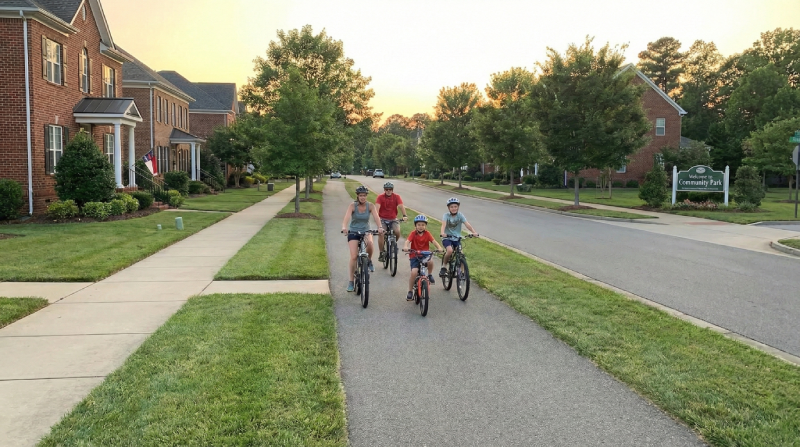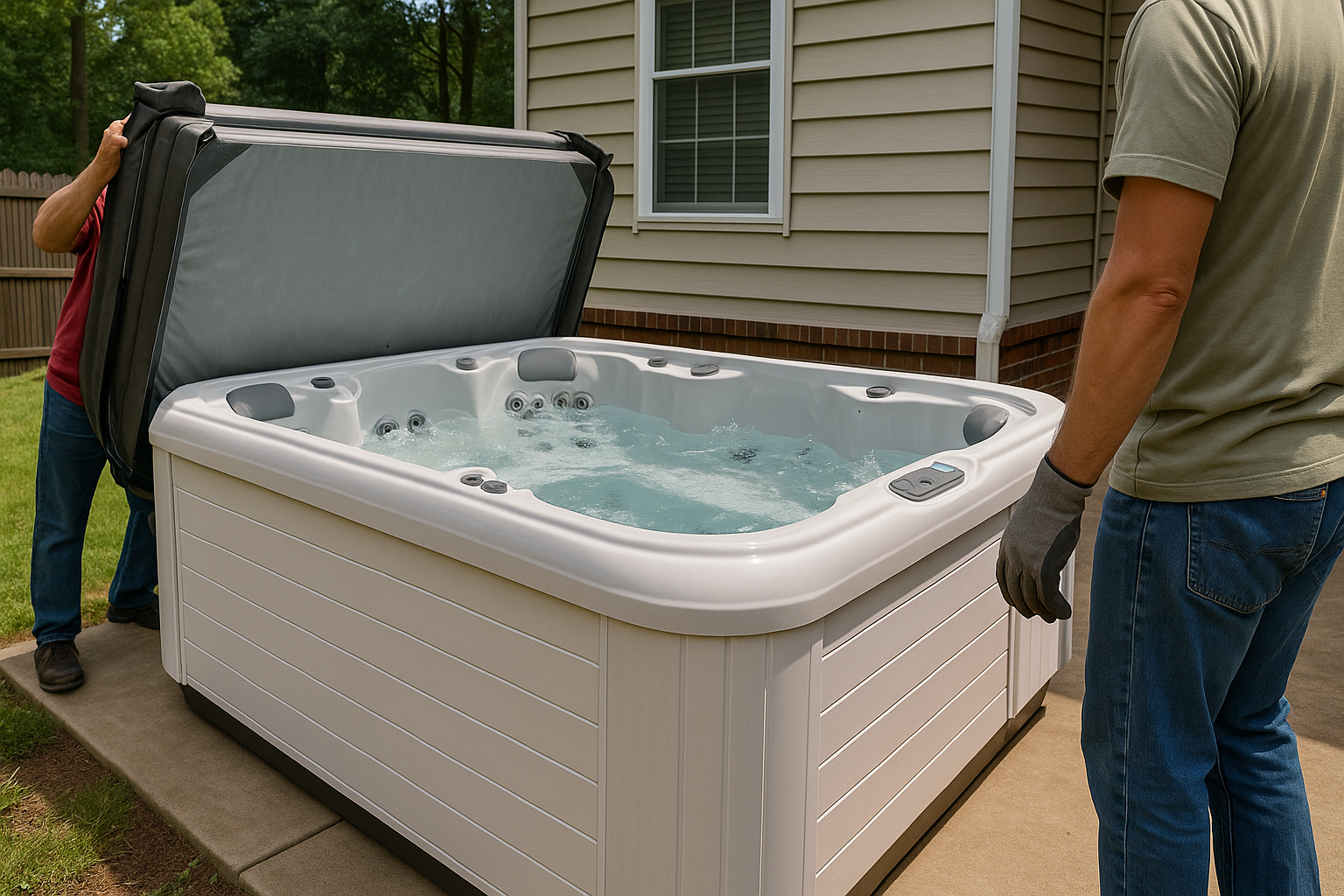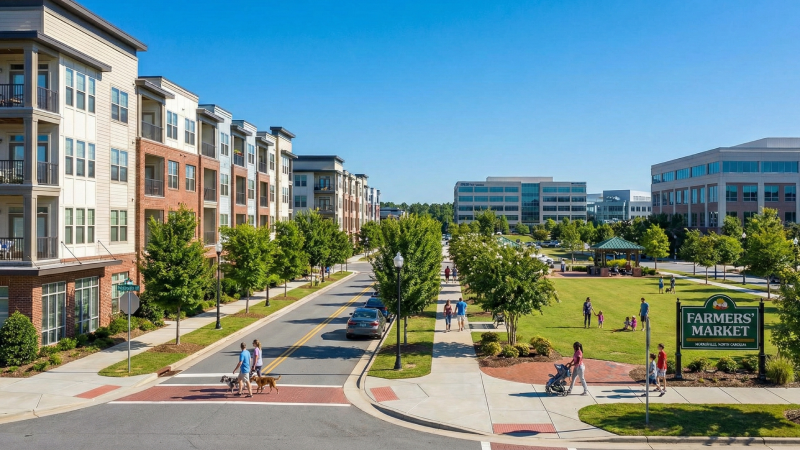Is Cary, NC, a good place to live? This mid-sized Wake County city offers low crime rates, quality public schools, and abundant green spaces while providing access to the Research Triangle's strong job market. Though primarily residential, Cary maintains a balanced mix of suburban calm and necessary amenities.
This guide examines Cary's housing costs, education options, employment opportunities, and lifestyle features to help you determine if this community matches your needs in 2025. We'll explore both the advantages that attract new residents and the challenges they face to give you a complete picture of life in Cary.
Key Facts About Cary, NC
Cary is in the Research Triangle region and has grown a lot over the past ten years as more professionals and families have moved to the area. Cary sits between Raleigh and Research Triangle Park, making it handy for professionals working in tech, biotech, and academic jobs in the region.
- Population: About 180,000+ residents.
- Location: Western Wake County, part of the Research Triangle region.
- Median Household Income: $130,000.
- Median Home Price: $640,000.
- Diversity: 23-24% foreign-born residents.
How's the Weather In Cary Year Round?
Cary has four distinct seasons. Summers are hot and humid, with temperatures often in the upper 80s and low 90s°F. Winters are fairly mild with average lows in the 30s and occasional light snow. Spring and fall have pleasant temperatures and colorful leaves, especially in autumn. The area gets about 46 inches of rain throughout the year, with summer thunderstorms and sometimes freezing rain in winter.
Safety & Crime: Is Cary, NC, Safe?
Cary has low crime rates compared to both regional and national averages. Crime data shows the town has been among the safer mid-sized cities in the country for over ten years.
Cary Crime Statistics
Cary's crime statistics show much lower rates compared to national averages. The Cary Police Department maintains a community presence and focuses on crime prevention, which helps residents feel secure.
For families with children and people concerned about safety, Cary's low crime rates are a big factor when comparing it to other suburban communities.
- Cary consistently ranks as one of the safest mid-sized cities in America,
- The violent crime rate is about 78% below the national average.
- Property crime happens at rates about 45% below the national average.
- The police department runs community engagement programs.
- Cary reported zero homicides in the most recent year and has extremely low rates of robbery and assault.
Schools & Education in Cary
Education is important for many people moving to Cary. The town's schools generally do well on standard measures compared to state and national averages, from test scores to graduation rates.
- Standardized test proficiency in Wake County (which includes Cary) was above 60% in 2024, versus ~52–53% for NC statewide.
- Multiple high schools (Green Level High, Wake STEM Early College, Green Hope High) rank in the top 500 nationally.
- Graduation rates are over 95% at most Cary high schools (Green Hope High’s four-year graduation rate was 98.1% in 2023).
- AP courses are widespread, and students can opt into IB programs at nearby schools if desired.
- Cary Academy, in particular, is a top-rated private school (grades 6–12), and multiple charter schools like Cardinal Charter serve families seeking alternatives.
Public Schools
Cary is part of the Wake County Public School System, which provides education through its network of schools.
- High Schools: Green Hope, Green Level, and Panther Creek High Schools rank in the top 500 nationally and top 10 in North Carolina.
- Test Scores: Students in Cary schools typically score 15-20% above state averages on standardized tests.
- Graduation Rate: Over 95% for most Cary high schools.
- AP/IB Programs: Advanced academic offerings available.
Private and Charter Options
Besides public schools, Cary offers other education choices to meet different needs and preferences. Families should know that school assignment in Wake County uses both base assignments and choice options. Popular schools can be competitive, and not all neighborhoods are assigned to the highest-rated schools.
- Private Schools: Cary Academy, Cary Christian School, and several Montessori options.
- Charter Schools: Cardinal Charter Academy, Sterling Montessori.
- Magnet Programs: Several specialized programs within WCPSS.
Cost of Living & Housing Market
The financial reality of living in Cary is more complex than its safety and education statistics suggest. While the town offers many amenities, this comes with higher costs that exceed regional and national averages. Housing is a major financial consideration for potential residents, with prices that have gone up substantially in recent years.
- Housing costs in Cary are much higher than both the state and national medians.
- The real estate market remains competitive, with multiple offers common on desirable properties.
- New construction generally starts at above $600,000 for single-family homes.
- Non-housing expenses tend to be more moderate compared to housing costs.
- Higher median incomes help balance the higher cost of living for many residents.
Housing Costs
Housing is the biggest expense for most Cary residents, with a market characterized by steady price increases and competitive conditions. Cary's real estate market remains competitive, with the most desirable properties getting multiple offers. New construction continues, particularly in western and southern Cary, but typically starts above $600,000 for single-family homes.
- Median Home Sale Price: $620,000 (as of mid-2025).
- Typical Price Range: $450,000 to $900,000 for single-family homes.
- Median Rent: $1,800 for a two-bedroom apartment.
- Property Taxes: Combined rate of about 0.85% of assessed value.
Other Living Costs
Beyond housing, Cary residents experience more moderate costs for day-to-day expenses. While Cary's cost of living is about 20% above the national average, the higher median household income ($129,000) helps balance these costs for many residents.
- Utilities: Slightly below the national average.
- Groceries: On par with national averages.
- Healthcare: Slightly above the national average, but with good quality and access.
- Transportation: Above average due to car dependence, though gas prices are typically below national averages.
Job Market & Economy
Cary's economic landscape is shaped by its position within the Research Triangle, a major innovation hub. The town's job market offers opportunities across multiple sectors, with a focus on technology and life sciences. Residents have access to jobs with relatively short commute times.
- The unemployment rate consistently stays below both state and national averages.
- The median household income is much higher than the national figures.
- Major employers include both Fortune 500 companies and startups.
- Proximity to Research Triangle Park creates professional opportunities.
- Average commute times remain moderate despite regional growth.
Major Employers & Industries
Cary's employment landscape covers multiple sectors, with technology being prominent due to proximity to Research Triangle Park.
- Technology: SAS Institute (headquarters), Epic Games, Verizon, MetLife.
- Biotech/Healthcare: Numerous companies in nearby RTP.
- Education: Wake County Public Schools, proximity to major universities.
- Retail/Hospitality: Expanding sector with growth in tourism and shopping.
Employment Metrics
Economic indicators show Cary's job market and overall economic health compared to regional and national benchmarks. The proximity to Research Triangle Park (10-15 minutes), Raleigh-Durham International Airport, and three major research universities (NC State, UNC Chapel Hill, Duke) creates opportunities for professionals across many industries.
- Unemployment Rate: About 3.5% (below state and national averages).
- Job Growth: Positive, with 2-3% annual growth in most sectors.
- Median Household Income: $129,000 (much higher than the national average).
- Commute Time: Average of 22-23 minutes.
Lifestyle & Community
Daily life in Cary blends suburban living with increasing amenities. The town has invested in infrastructure while keeping its character as a planned community. Residents have access to recreation options, dining choices, and cultural activities in a well-maintained environment.
- The town maintains a network of parks, greenways, and recreational facilities.
- Cultural diversity is reflected in an international dining scene.
- Downtown Cary has been revitalized in recent years.
- The climate offers four distinct seasons with relatively mild winters.
- Proximity to Raleigh provides access to additional urban amenities.
Parks & Recreation
Outdoor spaces and recreational opportunities are notable features in Cary.
- Parks: Over 30 public parks, including the 310-acre Bond Park.
- Greenways: 80+ miles of connected trails.
- Sports Facilities: WakeMed Soccer Park, USA Baseball National Training Complex, and tennis complexes.
- Lakes: Lake Crabtree and Lake Jordan are within short driving distance.
Dining & Shopping
Cary's commercial landscape has changed, offering more diverse options that reflect its growing and international population.
- Downtown Cary: Growing restaurant scene and local shops.
- Crossroads Plaza: Major shopping center with national retailers.
- Park West Village: Upscale shopping and dining.
- International Cuisine: Asian, Indian, Middle Eastern, and European restaurants reflecting the diverse population.
Arts & Culture
Cultural amenities in Cary have grown, reflecting both public investment and the town's increasingly diverse population.
- Cary Arts Center: Classes, performances, and exhibitions.
- Koka Booth Amphitheatre: Outdoor concerts and events.
- Festivals: Diwali, Chinese New Year, and Lazy Daze Arts & Crafts.
- Proximity to Raleigh: Access to museums, theaters, and larger cultural venues.
Neighborhoods & Real Estate
Cary has various neighborhoods, each with its own character and amenities. The town's residential areas range from established communities with mature trees to newer developments with modern features. Housing options span many styles and price points, though even entry-level properties cost more compared to surrounding areas.
- Neighborhood selection greatly impacts daily lifestyle and school assignments.
- Established communities like Preston and Lochmere offer mature landscaping and community amenities.
- Western and southern Cary feature newer developments with contemporary designs.
- Downtown has seen increased investment in both historic renovations and new construction.
- Prices vary significantly across neighborhoods, though affordability remains challenging.
Popular Neighborhoods
Potential residents can choose from many well-established and newer neighborhoods, each with specific advantages and price considerations.
- Preston: Established luxury community with golf courses and larger lots ($700,000+).
- Lochmere: Mature neighborhood with lakes and trails ($550,000-800,000).
- Regency: Family-friendly with strong schools ($500,000-700,000).
- Downtown Cary: Historic homes and new developments in the walkable town center. ($450,000-900,000).
- West Cary: Newer developments with modern amenities ($600,000-900,000+).
When choosing a neighborhood, consider school assignments, commute patterns, and lifestyle preferences along with your housing budget.
Pros and Cons of Living in Cary
Living in Cary has advantages and challenges. This area high-level schools, consistently low crime rates, and a convenient location within the Triangle region. However, residents face significantly higher housing costs compared to those in surrounding areas, and some find that the planned suburban environment lacks character and uniqueness.
While ongoing development has increased the availability of amenities and dining options, it has also led to growing traffic congestion, especially during peak hours. Cary offers a well-maintained community with good infrastructure, ideal for families and professionals who seek safety and education. However, prospective residents should carefully consider whether the premium housing prices align with their budget and lifestyle preferences.
Pros of Living in Cary
Cary has several advantages that have made it a popular residential community.
- Safety: Among the safer communities in America.
- Schools: Well-rated public education and numerous private options.
- Job Market: Low unemployment and high median incomes.
- Location: Central to RTP, Raleigh, Durham, and RDU Airport.
- Recreation: Parks, greenways, and outdoor activities.
Cons of Living in Cary
Despite its positives, Cary has several challenges and limitations that potential residents should consider.
- High Housing Costs: Much higher than state and national averages.
- Car Dependence: Limited public transportation outside the downtown area.
- Traffic Congestion: Growing issues during rush hour.
- Lack of Nightlife: Limited entertainment options compared to Raleigh or Durham.
- "Cookie-Cutter" Reputation: Some find the planned suburban atmosphere lacking character.
Is Cary Right for You?
Cary, NC, offers safety, good schools, and suburban amenities, with access to urban opportunities nearby. However, the high housing costs and mainly suburban character may not appeal to everyone. The town may be right for families and professionals who want a well-managed community with good schools and recreation options. Those looking for more affordable housing, vibrant nightlife, or unique architectural character might prefer other locations in the Triangle region.
Cary functions as a planned suburban community with services and amenities that meet the needs of many residents. For those who like this type of suburban living and who can afford the housing costs, Cary provides convenient access to the region's professional, educational, and cultural opportunities.
Moving Muscle is a Cary, NC, moving company. We help you save up to 40% on your move through our labor-only service and transparent pricing, while giving you control of your belongings.
Frequently Asked Questions About Living in Cary
Is Cary a good place for families?
Yes, Cary ranks as one of the best places for families in North Carolina and the United States. Families appreciate Cary's safety, excellent schools, parks, and many kid-friendly activities.
Is Cary a diverse community?
Yes, Cary has a diverse population compared to other suburban Southern communities. About 23-24% of residents were born in other countries, with large Asian (especially Indian and Chinese), European, and Latin American communities. Around 26% of households speak a language other than English at home.
What is the political climate of Cary?
Cary is politically moderate compared to nearby areas. The town government focuses on practical management and planning rather than partisan issues. While Wake County has voted more Democratic recently, Cary residents have mixed political views.
How are the healthcare facilities in Cary?
Healthcare in Cary is very good, with WakeMed Cary Hospital offering many services. The Triangle region has top-quality healthcare through Duke University Health System, UNC Health, and WakeMed's network. You can usually see specialists without long wait times.
Is Cary good for retirees?
Cary attracts many retirees because of its safety, good healthcare, and amenities, though high housing costs can be a problem for people on fixed incomes. There are several communities specifically for people 55 and older. North Carolina's reasonable taxes on retirement income are also a plus.
In the end, Cary offers a specific type of suburban living: safe, clean, well-managed, with good amenities and opportunities. For people who like this lifestyle and can afford it, Cary lives up to its reputation as one of North Carolina's most desirable communities.









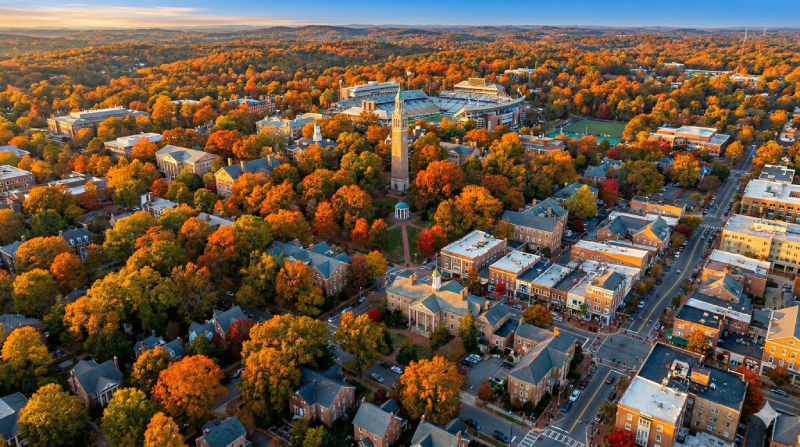













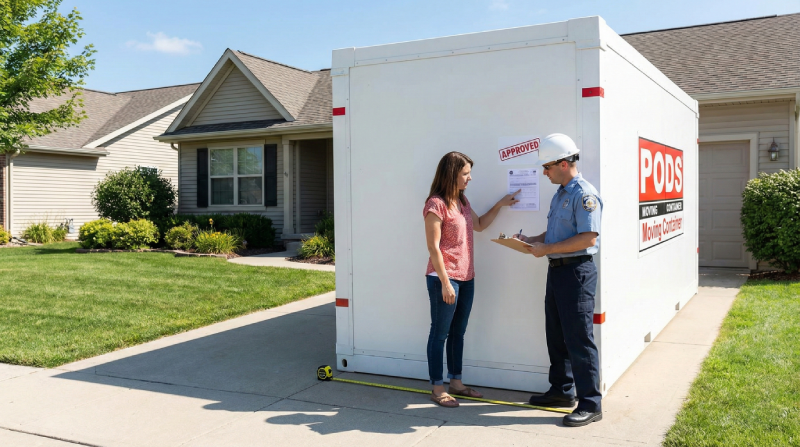
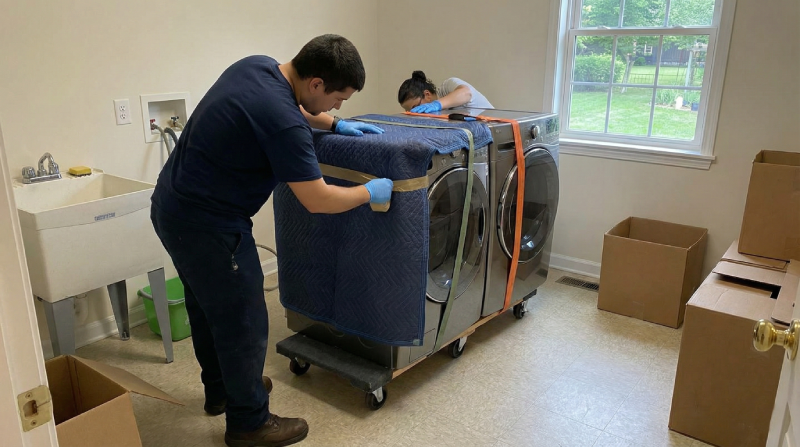



















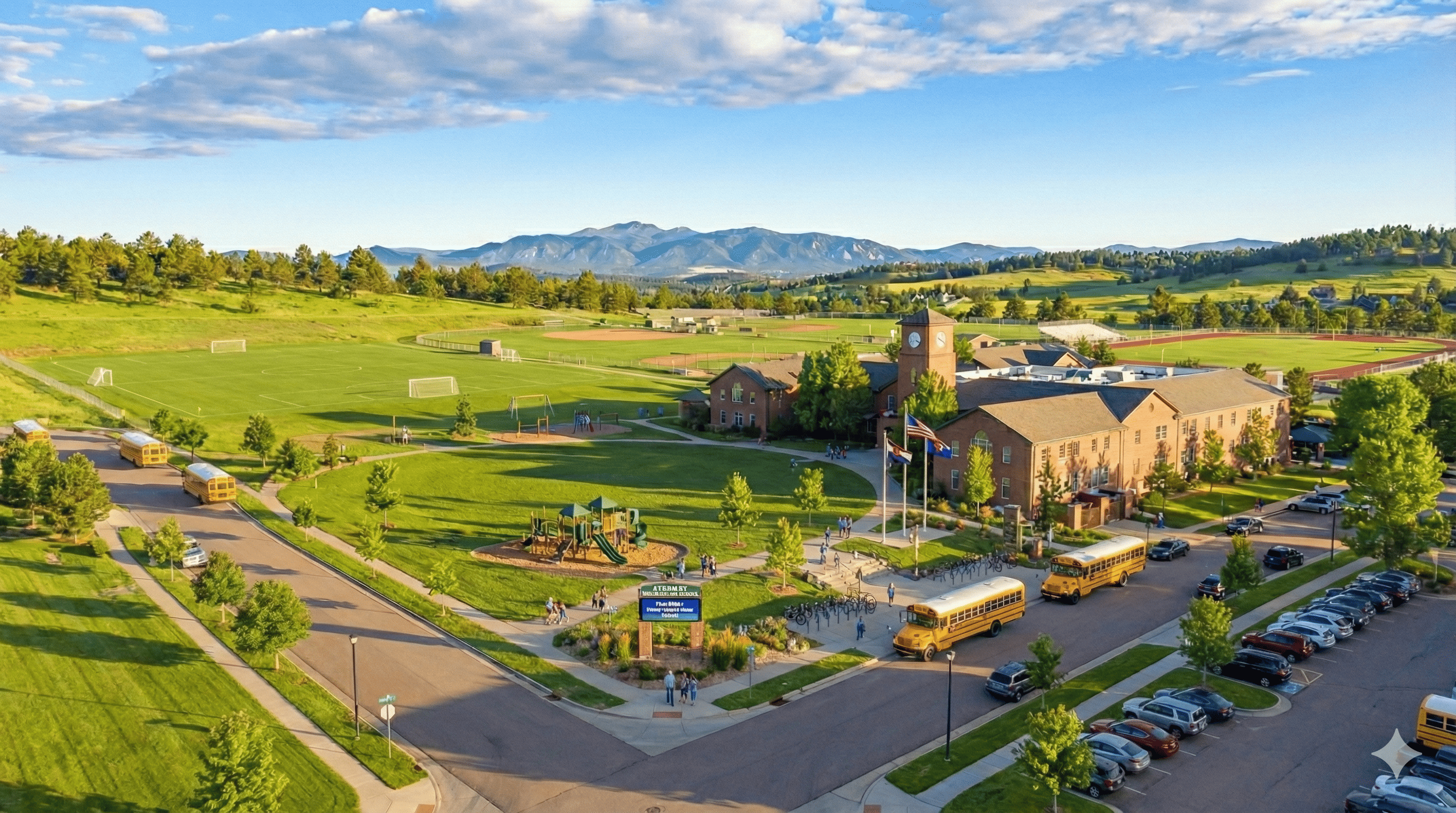


.webp)



